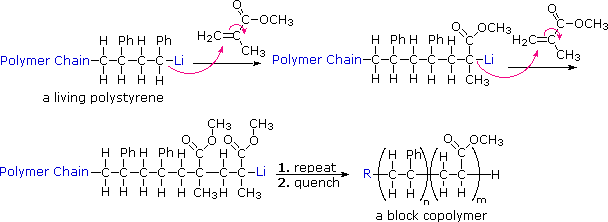Ingenious Polymers: Revolutionizing Modern Production
Ingenious Polymers: Revolutionizing Modern Production
Blog Article
Exploring the Varied Applications and Advantages of Polymers in Different Industries
Polymers, with their diverse series of residential or commercial properties and capabilities, have actually come to be indispensable in various industries, each reaping unique take advantage of their application. Polymers. From enhancing safety and performance in the automotive sector to revolutionizing clinical tools in the medical care market, polymers play an essential function. Furthermore, their environment-friendly nature is changing the landscape of sustainability practices. As we look into the depths of polymers in electronic devices, we discover advanced developments, while their structural stability transforms the world of building and construction and facilities. The pervasive impact of polymers across industries is a testimony to their adaptability and versatility, forming the future of many industries.
Automotive Market Applications
Polymers play a crucial duty in enhancing the performance and toughness of numerous parts within the automotive industry. One famous usage of polymers in the vehicle market is in the manufacturing of light-weight elements.

Healthcare Market Advantages
In different health care applications, the benefits of making use of polymers are extensively identified for their varied array of beneficial homes. Polymers play a critical duty in the medical care sector as a result of their convenience, biocompatibility, and cost-effectiveness. Among the key benefits of polymers in health care is their capability to be customized to particular needs, such as flexibility, resilience, and biodegradability, making them optimal for a wide variety of medical applications.
Polymer-based materials are thoroughly utilized in medical devices, such as catheters, implants, prosthetics, and drug distribution systems, as a result of their biocompatibility and capability to imitate natural cells. These products can minimize the risk of allergies or beings rejected, enhancing patient safety and security and end results. Furthermore, polymers are lightweight, making them ideal for wearable clinical devices and ensuring person comfort.
In addition, polymers allow the growth of ingenious therapy techniques, such as hydrogels for cells engineering and nanocomposites for targeted medication delivery. Their simplicity of handling and sterilization makes them necessary for maintaining high requirements of health in healthcare setups. Overall, the diverse benefits of polymers add considerably to innovations in medical innovation and person care.
Environmental Advantages of Polymers

In addition, polymers can add to energy cost savings because of their light-weight nature. In sectors such as transport, light-weight polymer products can help reduce fuel usage and greenhouse gas discharges. Furthermore, polymers can allow the growth of energy-efficient items such as insulation products that enhance power preservation in structures.
In addition, polymers play an essential function in reducing water air pollution. For example, using polymer-based filtration systems can effectively remove pollutants and impurities from wastewater, guarding water sources and ecological communities. Generally, the ecological benefits of polymers make them important assets in promoting sustainability and environmentally friendly practices throughout various industries.
Polymers in Electronic Devices and Innovation
Thinking about the enhancing demand for cutting-edge and sustainable solutions in modern-day markets, the integration of innovative polymer innovations in the realm of electronic This Site devices and innovation has become an essential approach for driving performance and performance. Polymers have actually transformed the electronic devices sector by making it possible for the production of lighter, extra adaptable, and resilient electronic gadgets. From smartphones to clinical devices, polymers play a crucial duty in enhancing product style and functionality.
One significant benefit of polymers in electronics is their shielding properties, which help shield delicate digital components from environmental variables and electrical disturbance. In addition, polymers are necessary in the development of adaptable displays, wearable modern technology, and printed electronics, offering endless opportunities for developing smart and interconnected gadgets.
In addition, making use of polymers in digital packaging has actually brought about developments in miniaturization and thermal monitoring, boosting the general efficiency and reliability of electronic systems. As innovation remains to advance, the versatility and versatility of polymers will most certainly drive further development in the electronic devices sector, forming the future of modern technology.
Duty of Polymers in Construction and Infrastructure
The combination of sophisticated polymer materials in building and facilities tasks has actually reinvented the means frameworks are made and integrated in modern-day times. Polymers supply countless benefits in the construction industry due to their versatility, sturdiness, and cost-effectiveness. One crucial function of polymers in construction is their use in coverings and sealants, providing defense versus ecological variables such as wetness, UV radiation, and deterioration. Furthermore, polymers are utilized in the manufacturing of lightweight and high-strength get more composite products, boosting the architectural stability of buildings while decreasing total weight.
Moreover, polymers play an essential function in sustainable construction practices by making it possible for the development of energy-efficient frameworks. Protecting materials made from polymers help manage indoor temperature levels, decreasing the demand for heating and cooling systems and ultimately lowering energy intake. The use of polymer-based composites in facilities projects such as bridges and roadways improves their durability and decreases upkeep expenses. Overall, the consolidation of polymers in building and construction and facilities showcases their considerable effect on modern design practices.
Conclusion
In verdict, polymers play a vital role in different industries such as automobile, health care, environmental, electronics, and building and construction. Their functional homes make them valuable in developing innovative options and products. From improving fuel performance in automobiles to improving medical tools, polymers provide various advantages. Additionally, their effect on reducing waste and promoting sustainability highlights their importance in modern applications. The extensive use polymers shows their considerable payment to advancing innovation and boosting lifestyle.
Report this page